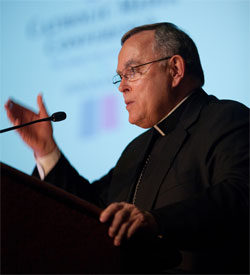Archbishop describes external and internal threats to religious liberty

Archbishop Charles J. Chaput of Philadelphia addresses attendees at the Catholic Media Conference in Indianapolis June 20. (CNS photo/Nancy Wiechec)
By Sean Gallagher
On the eve of the start of the “Fortnight for Freedom,” the U.S. bishops’ effort to galvanize Catholics across the country to pray for and learn about religious liberty, Philadelphia Archbishop Charles J. Chaput gave a major address on the topic during the 2012 Catholic Media Conference on June 20 in Indianapolis.
Arguing that “religious freedom is a cornerstone of the American experience,” Archbishop Chaput said the American founders “saw religious faith as vital to the life of a free people.
“Liberty and happiness grow organically out of virtue,” he said. “And virtue needs a grounding in religious faith.”
Religious liberty, however, is “more than freedom of worship,” Archbishop Chaput continued.
“It begins in worship, but it also demands preaching, teaching and service,” he said. “It’s always personal, but never private.”
This liberty seen as so vital to the nation’s founders, Archbishop Chaput said, is now facing threats that are “immediate, serious and real,” and are often linked to a hostile reaction to Catholic teachings on sexuality and life issues.
Citing an article written by University of Notre Dame law professor Gerry Bradley, Archbishop Chaput said critics of these teachings see them merely as “subjective religious ... that can’t be rationally defended ... and should be treated as a form of prejudice.
“In effect, 2,000 years of moral tradition and religious belief become a species of bias,” Archbishop Chaput said. “Opposing same-sex ‘marriage’ thus amounts to religiously blessed homophobia.”
In the face of such opposition to Church teaching, Archbishop Chaput said Catholics need to work hard to preserve their religious liberty.
“In practice, nothing guarantees our freedoms except our willingness to fight for them,” he said. “That means fighting politically and through the courts without tiring and without apologies.”
However, Archbishop Chaput suggested that threats to religious liberty can also be found within the Church in the United States.
“Religious liberty is an empty shell if the spiritual core of a people is weak,” he said. “Or to put it more bluntly, if people don’t believe in God, religious liberty isn’t a value. The worst enemies of religious freedom aren’t ‘out there’ among the legion of critics who hate Christ or the Gospel or the Church or all three. The worst enemies are in here, with us—all of us, clergy, religious and lay—when we live our faith with tepidness, routine and hypocrisy.”
Instead, Archbishop Chaput challenged his listeners that the vocation of all Catholics is to a “life of honesty, heroism and sacrifice.”
However, he said that “in our eagerness to escape it, to tame it, to reshape it in the mold of our own willful ideas, we’ve failed not only to convert our culture, but also to pass along the faith to many of our own children.”
Archbishop Chaput said the “Fortnight for Freedom” can be a conversion moment for Catholics to return to their challenging vocation in the midst of the struggle for religious liberty.
“If we don’t press now and vigorously for our religious liberty in the public arena, we will lose it,” he said. “Not overnight and not with a thunderclap, but step by step, inexorably.”
In an interview before his speech, Archbishop Chaput said that although U.S. bishops and other Catholic leaders of universities, hospitals and charitable agencies have played prominent roles in defending religious liberty in recent months, ordinary lay Catholics need to step up to make this struggle successful.
“The role of the bishop is to facilitate Catholics to be good Catholics,” he said. “But the place of good Catholics is in your home, your place of business, in your local community.
“So, the example of laypeople is much more important than the work of bishops when it comes to religious liberty. And it’s much more credible in the eyes of those who oppose us because they see the laity as fellow citizens. They see the clergy as somehow distant creatures from another planet. We’ll succeed or fail depending on the leadership of the laity.”
The first step for lay Catholics in taking up a leadership role in defending religious liberty, Archbishop Chaput said, “is for them to take the issue seriously.
“If they don’t take it seriously, we won’t succeed because the enemy of religious freedom does take its opposition seriously,” he said.
Archbishop Chaput also commented on the Catholic Health Association’s recent reversal of its previous support for President Barack Obama’s accommodation for employers opposed in conscience to the HHS mandate that requires that
abortion-inducing drugs, sterilizations and contraceptives be provided at no cost to their employees.
“I’m very happy that they finally saw the light and came on board,” he said, “because I think their hesitation to embrace the position of the bishops did damage to us in terms of unity on this issue.” †
